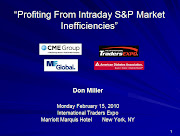Filling in some more missing pieces of the 30-month gap, I began playing small-stakes no-limit poker about a year ago -- partly because I've always wanted to and partly because I thought I'd learned enough watching and studying it that I'd have a decent shot at winning from time to time. [Yes, I'm still competitive in the worst way ... that hasn't changed over the last few years.] What I didn't realize, however, is that the subsequent experiences would have positive effects on my trading.
So last summer, I started playing in a local league that awards points in weekly tournaments for final table players, with the winner getting 500 points, second place getting 250, and so on. Then, at the end of each quarter, the person with the most points gains entry into a Foxwoods tournament with the chance to win a few thousand dollars. It's a fun group led by a great guy (thanks Jeff) who taught me some of the early ropes.
Which leads me to my first poker -> market comparison: Even in a small group of 20-30, the players reflect all segments of humanity, with strong parallels to market participants. Examples include the gamblers, the self-proclaimed know-it-alls, the bluffers, the sore losers, the sore winners ... you get the point. Just like the market. And while I've always advocated that any serious trader read The Tao of Poker, and have seen my published trading columns placed side-by-side with Phil Helmuth's poker columns in the past given the strategy similarities, it took experiencing cards first hand to have some of the notions sink into this trader's stubborn brain.
Most of you know my trading strategies. At the poker table, I consider myself to be a simple, inexperienced amateur with one basic strategy: play tight, quality hands the majority of the time, and vary from that only on occasion. It's essentially up to the other guy to figure out when I'm varying. And it's worked fairly well as I ended up winning this year's 1st Quarter event, and then finished in the money at the subsequent Foxwoods tourney, finishing 13th of about 120. [Footnote: the winnings pretty much paid for gas and a few meals as the real money is finishing in the top five.]
OK, so what does this have to do with my trading? Here are a few reflections:
1. Poker has magnified my personal trading weaknesses, and in some way has transferred potential market blunders from my large S&P trades to small scale poker losses [as in: Largest career S&P loss ever $80K; Largest Poker loss to date: $650]. Example: I suck when I'm tired. Period. Happens in poker all the time. I remember a few weeks ago when I was up strong in a cash game, and then gave much of it away in one hand at 3am on a poorly read hand after a six-hour stint. Seems that reinforcement has reduced the # of times I've tried to trade tired in the market.
2. You can't expect to win at poker [or the market] if you limit your time exposure, as probability requires time to play out in both cards and in the market. I still struggle with this in the market given non-market obligations, but I can say that I trade less now when I'm faced with a limited trading window vs. before I began my poker journey.
3. Bet strong and add to your position when you have a strong hand ... especially the nuts. This notion has had the greatest positive influence on my trading. Size at the right time matters in both poker and trading, as one can make a month's worth of income on a single trade/hand. I will say that I'm better at this in my trading vs. poker, giving the occasional necessity to hide one's hand strength in poker. At the table, I still struggle with deciding when to go for it vs. hiding. No need to hide hand strength when trading the S&Ps electronically!
In fact, I credit poker reinforcement directly for my size & trade management last Thursday, when I bought heavy within a point of the market's morning puke point and had my best take in several years in about a ten minute window. [I could almost hear Jeff saying, "Bet those trips strong".]
Of coursing sensing with high probability that one has the nuts and actually having it are two different things. At least in trading, there are position reducing stop actions that can take effect when wrong. In no-limit hold 'em, if you're wrong ... see ya. [I still find myself calling a poker all-in with what often turns out to be the second-best possible hand. Happened yesterday when I had Aces over Kings and didn't put my opponent on three Jacks. Lost a bit on that one. Another time yesterday, I had A-K and the flop -- I kid you not -- came A-A-A. Once-in-a-lifetime hand. Problem was there was no money in the pot and just two of us ... one was the Big Blind with a likely crappy hand ... who checked it down to the river where I couldn't even get a small value bet called. Imagine, having one of the best hands you can have and getting zippo for it.] Which brings me to another thought ...
3. Tilt. Happens at both the table and market. Advantage unemotional pros. 'Nuff said. And lastly ...
4. Playing poker has made trading "feel" easy in comparison. Any decent card player knows the element of short-term luck is a key factor in poker. "Short-term luck/long-term skill" is the winning combination cited by most poker pros. And while on rare occasions "luck" occurs in the markets [i.e. being long when a surprise interest rate cut is announced], the "luck" factor is pretty much absent in the trading world.
This luck factor still aggravates me to death in my poker game. Like anyone, I've drowned at the river in non-cash tournament games by some donkey whose called my trip Aces with a 1% hand but catches runner-runner to fill out his 2-6 straight. I've then seen myself morph into the very "sore loser" that I used to criticize, spewing something like "You called with that crap??"
But those are the gamblers playing with either none of their personal cash at stake (free tournaments) or playing cash games for a very short time before they bust. Thankfully, the market is a true cash game where the gamblers always donate their chips to the pros.
I'd hate to try to earn my living at the table ... but I'll keep playing for the trading benefits.
Sunday, July 6, 2008
Subscribe to:
Post Comments (Atom)
















3 comments:
YOU'RE BACK!!
Wow, thought you'd flat out disapeared after you weren't with Trade Maven anymore (at least on their website.)
COOL.
Glad to see you back
Steve Williams
TM Inner Circle Alumni
Hey Steve! Great to hear from you. Just wanted some privacy for a while, but looking forward to sharing thoughts again.
Like anyone, I've drowned at the river in non-cash tournament games by some donkey whose called my trip Aces with a 1% hand but catches runner-runner to fill out his 2-6 straight. I've then seen myself morph into the very "sore loser" that I used to criticize, spewing something like "You called with that crap??"
It's so hard to be objective after a brutal suckout. But when we stop to think about it, we got exactly what we wanted--some idiot calling us drawing very, very thin.
It's so easy to forget about the 99% of the time we win in that situation. It's so easy to forget that given enough iterations even the most unlikely of events will occur. It's easy to forget that the odds and reality converge over the long run. It's easy to lose your discipline and start playing sub-optimal starting hands.
The analogy to trading is obvious. If we're trading well (following our plan, exiting our losers when we should, taking only good set-ups) but still losing money, it's easy to go on tilt and turn the day/week/month into a disaster.
The poker/trading pro continues to follow his plan and understands that if he continues to play/trade with an edge he'll eventually be a winner.
Post a Comment